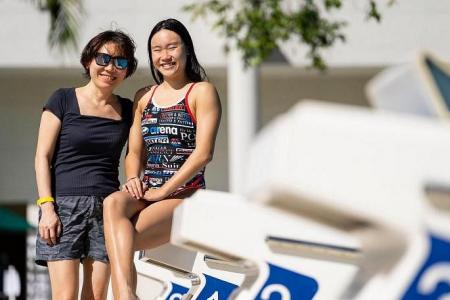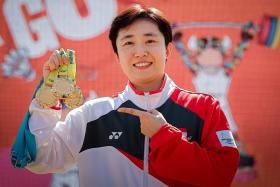Medal sweep, perfect IB score: How to raise a child like Gan Ching Hwee
Before each race at the recent SEA Games in Vietnam, Singaporean swimmer Gan Ching Hwee would lose herself in a few games of Mario Kart or Taiko No Tatsujin, a rhythm game, to get her competitive spirit going.
"It raises my heart rate and brings out the competitiveness in me, like I want to win," she says.
The 19-year-old made waves this year at the Games with her clean sweep of five gold medals in all her swimming events, four individual events and one relay.
This is Gan's third SEA Games. She snagged a bronze medal at the 2017 Games in Kuala Lumpur, then two gold and one silver at the 2019 edition in the Philippines. She is best known for her long-distance races and won the women's 1,500m freestyle race at the recent Games.
Not only is Gan an accomplished athlete, but she is also a high-achieving student. The former Anglo-Chinese School (Independent) student achieved a perfect score of 45 for her International Baccalaureate (IB) examinations last November. And she had no tuition at all.
Her secret is good time management, a skill she picked up in her formative years.
"Besides swimming, I did gymnastics, golf, ballet and piano in primary school and my dad taught me squash, badminton and table tennis. I went up to Grade 6 for ballet," she says.
She recalls her family planning their weekly schedule on her father's computer, setting a timetable for the week's activities for both her and her brother, who is a year older and in national service. This helped them keep track of their weekly schedule in advance.
This is a habit she still has today as an undergraduate majoring in nutrition science at Indiana University in the United States. Using Google Sheets, she puts aside time for training, lessons, meals and, a recent hobby, crocheting.
By the time she was 11, Gan had narrowed her extracurricular activities down to swimming and ballet. She faced a dilemma in deciding which of the two to prioritise as she had just gone on pointe in ballet.
Gan, a former pupil of Tao Nan School, says: "I was going for swimming training five or six times a week and I would always show up late because I had ballet right before that. But my coaches always said I had the potential to go further and encouraged me to stay in swimming."
Once she dropped ballet in Primary 5, she started attending up to 10 swimming training sessions a week, twice a day. She would set her alarm to rise at 4.30am for training at 5.30am.
Gan's mother Lee Chui Leng, 49, a project manager, says her daughter's self-motivation comes from being entrusted with responsibility from a young age. Enrolling her children in sports also helps as Ms Lee believes that it "instils discipline and moulds the character".
Ms Lee was more hands-on when her daughter and son were toddlers, in line with the Montessori belief that building a foundation was vital to a child's development. Hence, she took time to understand how her children learnt and cultivated values such as responsibility and resilience.
However, she relaxed once they went to school.
"When they were schooling, I refused to check their bag for homework assignments because I believed they need to be accountable to the teachers, not me," she says.
Instead, her support for her daughter comes in different forms. "In the past, it was mostly physical support like preparing her meals and fetching her to and from the pool. Now, it is more mental support," she adds.
With her daughter studying abroad, Ms Lee finds herself "nagging at her more" and giving her "gentle reminders" to take care of herself.
"The pressure from swimming at an elite level is particularly high and, sometimes, it can be too much for a young swimmer to deal with. He or she definitely needs a lot of love, help and guidance to see him or her through."
Ms Lee believes that making the best of every situation and persevering in the face of hardship is the most important advice she has for her daughter, and her best tip for other parents.
"As the Chinese saying goes, 'Even if the sky falls, take it as a warm blanket.' Stay courageous. It is also okay to cry and show your emotions. Most importantly, pick oneself up after a failure and charge on."
Gan agrees. Noting that her career has had many ups and downs, she says a strong support system - hers being her family, sport psychologist and friends - is key to overcoming challenges.
"Not every one has his or her best races. But having a good team helps you to refocus, move on and make the next race a better one."
As part of her "self-talk", which Gan says many athletes engage in, she reminds herself to do her best and to be consistent and happy.
"I'll see where swimming takes me. Of course, I'll keep working to qualify for the Olympics, but I'm just going to go with the flow."
Get The New Paper on your phone with the free TNP app. Download from the Apple App Store or Google Play Store now


